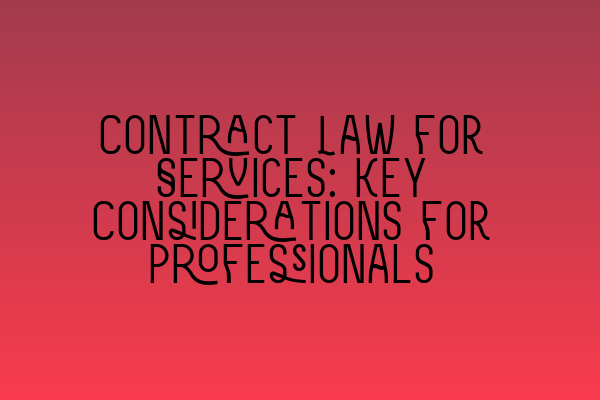Contract Law for Services: Key Considerations for Professionals
In the world of business, professionals often provide services to their clients. Whether you’re a lawyer, accountant, consultant, or any other type of service provider, entering into contracts is an essential part of your work. Contract law governs these agreements and ensures that all parties involved are protected and their rights are upheld.
In this article, we will explore the key considerations for professionals when it comes to contract law for services. We’ll discuss the importance of a well-drafted contract, essential clauses to include, and how to handle breach of contract situations. So, let’s dive in!
The Importance of a Well-Drafted Contract
A well-drafted contract is the foundation of a successful business relationship. It sets clear expectations, outlines the scope of work, defines the rights and obligations of each party, and protects you from potential legal disputes. Having a professionally drafted contract ensures that both parties know exactly what they are agreeing to and helps prevent misunderstandings or disagreements down the line.
To create a well-drafted contract, it’s advisable to seek the expertise of a contract law solicitor. They will have the knowledge and experience to craft a contract that covers all necessary points, complies with relevant laws and regulations, and protects your interests. If you’re an aspiring solicitor looking for guidance, check out our article on Mentorship for Aspiring Solicitors: Nurturing Talent in the Legal Field.
Essential Clauses to Include
When drafting a contract for services, there are several essential clauses that you should include to ensure clarity and protection. Let’s take a look at some of them:
- Description of Services: Clearly state the nature and scope of the services you will provide. This helps manage client expectations and avoids any potential disputes regarding the deliverables.
- Payment Terms: Specify the payment amount, method of payment, and any applicable invoicing or billing terms. This ensures that both parties understand their financial obligations from the outset.
- Termination: Include provisions for termination of the contract, specifying the conditions under which either party may terminate the agreement. This protects both parties in case unforeseen circumstances arise.
- Intellectual Property: Address ownership and usage rights of intellectual property created during the provision of services. This clause helps avoid any disputes over ownership or unauthorized use of intellectual property.
These are just a few examples of the essential clauses to include in a contract for services. You may need to tailor your contract to suit your specific profession and industry. If you want to learn more about navigating the complexities of the legal system, check out our article on Legal Challenges and Pitfalls: Navigating the Complexities of the Legal System.
Handling Breach of Contract Situations
Despite your best efforts to create a well-drafted contract, there may be instances where one party fails to fulfill their obligations, leading to a breach of contract. It’s crucial to know how to handle such situations to protect your rights and seek appropriate remedies.
If you believe the other party has breached the contract, the first step is to review the terms of the agreement and assess the nature and extent of the breach. You may want to consult with a contract law solicitor to understand your legal options and determine if negotiation or legal action is appropriate. They can help you navigate the complexities and guide you on the best course of action to resolve the dispute.
If you’re interested in starting your legal journey and want to know more about law school in the UK, check out our comprehensive guide on Law School in the UK: Your Guide to Starting Your Legal Journey.
Conclusion
Understanding contract law for services is vital for professionals in any field. It ensures that both parties are on the same page, protects your rights, and helps mitigate potential risks. By creating a well-drafted contract and including essential clauses, you can set the foundation for a successful business relationship.
If you find yourself facing a breach of contract situation, consult with a contract law solicitor to get the necessary guidance and support. They have the knowledge and experience to assist you in resolving disputes and seeking appropriate remedies.
Remember, contract law is a complex field, so it’s always advisable to seek professional legal advice. If you want to learn more about the Solicitors Qualifying Examination (SQE) and what you need to know, check out our informative article on Demystifying the Solicitors Qualifying Examination (SQE): What You Need to Know.
